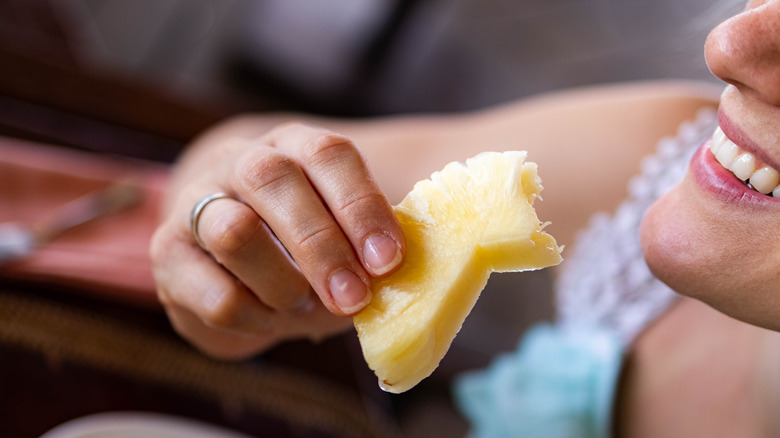Eating Pineapple Has An Unexpected Effect On Your Cholesterol
Pineapples — you can consume them baked, grilled, or freshly cut and their sweet and slightly tart flavor hiding under a prickly rind is irresistible to most.
Originally from South America, this tropical fruit has spread across the world with the top three countries that produce the fruit being Costa Rica, Indonesia, and the Philippines. If you're like most, you probably enjoy pineapples in salads, cocktails, or a dessert. From boosting your immunity (thanks to its antioxidant content), to lowering your risk of cancer, and aiding digestion, pineapples offer a lot of unexpected benefits.
Turns out, there's one particular nutrient in this fruit that can influence your blood cholesterol — bromelain. A protein-digesting enzyme that's present in the fruit and stem of pineapple, bromelain can help break down cholesterol plaques in your arteries. This means healthy blood flow and less risk of heart disease. According to a 2021 study published in the journal Nutrition & Metabolism, eating pineapple every day was associated with protection against hypercholesterolemia — high levels of low-density lipoprotein (LDL) or bad cholesterol in the blood. The study also found that daily pineapple consumption could reduce weight gain. Obesity can be a stress factor on your heart too.
Other ways in which pineapple can boost heart health
Bromelain aside, pineapple can be good for your heart health because of its fiber, potassium, and vitamin C content. One cup of pineapple, or 165 grams of fruit, contains 2.31 grams of total dietary fiber, 180 milligrams of potassium, and 78.9 milligrams of vitamin C.
From reducing blood pressure and lowering bad cholesterol levels to decreasing inflammation, fiber can do a lot for your body. As an unexpected bonus, fiber is great for healthy digestion and overall gut health. Potassium helps regulate blood pressure and reduces your risk of heart disease and stroke. Antioxidants like vitamin C work wonders for your body. From tissue growth and repair to immune system health and prevention of cancer, arthritis, and heart disease, there are a lot of reasons to love pineapple's vitamin C content.
Does this mean you should be loading up on pineapples every day for its cholesterol-friendly benefits? There are a few things to keep in mind.
How to consume pineapple without overdoing it
As with most cases, even fruits and vegetables, when you eat too much pineapple, you may start to see some worrying symptoms in your body. An excess of vitamin C intake could lead to an unexpected effect on your gut — we're talking nausea, diarrhea, or heartburn and too much bromelain could lead to diarrhea, excessive menstrual bleeding, or a skin rash. Additionally, people who take blood thinning medication may want to be wary of too much bromelain, as this enzyme can influence blood clotting. If you're taking the pineapple juice route, mind the potassium levels, especially if you have kidney problems and can't flush out excess potassium in your system.
Although pineapple allergies are not common, you could be allergic to the fruit. Symptoms of a pineapple allergy include hives, stomach pain, vomiting, diarrhea, swelling of the face, tongue, throat, and lips, difficulty breathing, dizziness, and even anaphylactic shock.
If you don't like going through the trouble of buying a whole pineapple and cutting off its rind to get to the fruit, you could choose the store-bought pre-cut versions but be mindful of added sugars. As for how to enjoy the fruit, the sky is the limit here. Pineapples are a sweet treat that goes well in desserts and savory dishes. But if you're watching your cholesterol levels, you may want to stick with heart-healthy recipes like chicken stir-fry with pineapples, a pineapple smoothie with yogurt, or pineapple-baked oatmeal.



